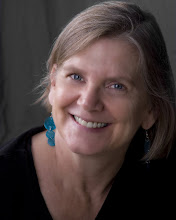
It's a blessing, having old parents. Yes, they're creaky and crumbly and leaky and shuffly, and shrinking in size and stature. But I adore them. And every time I see them I come away with a new slant on my own life--and on theirs.
I notice how my mother, who also adores me, still needs to make comments about my appearance . . .and other people's. I see more clearly the provenance of my own judgmental streak.
When I first arrived in Philadelphia, after not seeing them for three months:
"You've gained weight!"
"Mother, is that the first thing you want to say to me?"
"Oh, it suits you, only I think your life is better when you're, you know, lighter. Things go better for you."
Note to self:
Never never never comment on my own daughters' sizes.
"Don't you think those ends should be trimmed?" she asks, touching my hair.
"Yes, Mother. I just haven't had time yet."
"That's right. I remember. You got a cut just before you came last time."
Subtext: Please get a hair cut before you visit next time. I want to show you off.
"I didn't know women wore their shirt tails out. That must be a new style."
OK. She hates my new Gap shirts, even though I painstakingly ironed them and they're
fresh and bright and without stains.
"Mother. That woman over there told me she liked my outfit."
"Oh. Her."
"Don't you want to shower before going?"
Note: I'm going to the dining room to get a to-go styrofoam cup of coffee since my parents don't drink it anymore. It is 7 AM. I am fully dressed, hair brushed, and I showered yesterday and nobody, in the dining room, is going to even notice me.
But really my mother and I are incredibly close; we always have been. I'm not being ironic.
Some of the best times in my life involve lying on my mother's perfectly made bed, a cross breeze wafting through the open windows, and chatting with her--watching her as she bustles around her room getting ready to go out. I remember watching her get ready for work--slip, girdle, stockings, bra, linen dress, heels. And watching her get ready for parties--perfume, matching hand bag, pearls. Always always: lipstick and a compact.
Eureka! Maybe that's why I love lying down so much, and always want to stretch out on a couch or a bed--wherever I am. Lying down reminds me of being with my mom. I lie in bed to talk on the phone; I lie on couches at parties to drink wine and talk; I lie on my living room couch and stare out the window. I've never made this connection before.
See. Having parents who last a long time is a blessing.













